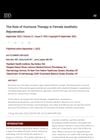 6 citations,
August 2023 in “Fertility and Sterility”
6 citations,
August 2023 in “Fertility and Sterility” The 2023 guideline for PCOS suggests using updated diagnostic criteria, assessing related health risks, and recommends lifestyle changes and specific treatments for symptoms and fertility issues.
5 citations,
October 2017 in “JOGC/Journal of obstetrics and gynaecology Canada” The conclusion is that proper diagnosis and long-term treatment, including medication, hair removal, and lifestyle changes, are important for improving hirsutism, especially in PCOS patients.
 4 citations,
September 2014 in “Elsevier eBooks”
4 citations,
September 2014 in “Elsevier eBooks” Use some skin medications with caution during pregnancy; avoid strong steroids, certain eczema treatments, and systemic retinoids, but many topical treatments and nasal sprays are safe.
 3 citations,
February 2021 in “Evidence-based Complementary and Alternative Medicine”
3 citations,
February 2021 in “Evidence-based Complementary and Alternative Medicine” The Chinese herbal supplement BeauTop can potentially boost hair growth and thickness by increasing a protein called Vascular Endothelial Growth Factor.
3 citations,
November 2019 in “Journal of the ASEAN Federation of Endocrine Societies” A 20-year-old woman with a rare form of Turner syndrome showed improvement with hormonal therapy and needs comprehensive care.
3 citations,
April 2019 in “Journal of the Endocrine Society” Satoyoshi syndrome can occur without causing premature ovarian failure.
 2 citations,
August 1987 in “Australasian Journal of Dermatology”
2 citations,
August 1987 in “Australasian Journal of Dermatology” Birth control pills can cause skin issues but may help with acne and hirsutism, and choosing the right type can minimize side effects.
1 citations,
February 2024 in “Cosmetics” Cannabidiol shows promise as an effective treatment for acne.
 1 citations,
October 2022 in “Journal of food and nutrition research”
1 citations,
October 2022 in “Journal of food and nutrition research” Cinnamon may help manage obesity and improve conditions related to Polycystic Ovary Syndrome (PCOS).
1 citations,
August 2022 in “Veterinary medicine and science” The main prostate diseases in dogs are benign growth, infections, and cancer, with various treatments ranging from drugs to surgery, but cancer treatments have limited success.
 1 citations,
October 2015 in “Journal of endocrinology and diabetes”
1 citations,
October 2015 in “Journal of endocrinology and diabetes” Understanding Polycystic Ovary Syndrome (PCOS) and its causes can lead to effective treatments.
1 citations,
August 2021 in “Arhivʺ vnutrennej mediciny” Hormonal imbalances can cause hair loss, and understanding them can help develop better treatments.
 August 2024 in “Drug Design Development and Therapy”
August 2024 in “Drug Design Development and Therapy” Decursin shows promise for treating cancer, neuroprotection, inflammation, and hair loss.
 July 2024 in “Skin Appendage Disorders”
July 2024 in “Skin Appendage Disorders” Certain medications, including some immune drugs, contraceptives, and hair loss treatments, are often linked to hair loss.
February 2024 in “Biomedicines” Pregnant women with PCOS have higher levels of Neurokinin B in the placenta, especially with female babies.
 December 2022 in “International Journal of Current Science Research and Review”
December 2022 in “International Journal of Current Science Research and Review” Polycystic Ovary Syndrome (PCOS) is a common but often undiagnosed disorder in women that can cause irregular periods, infertility, and other symptoms, and can be managed with lifestyle changes, medication, and sometimes surgery.
January 2017 in “Springer eBooks” Understanding genes and hormones is crucial for managing male puberty and sex development disorders.
 January 2006 in “Elsevier eBooks”
January 2006 in “Elsevier eBooks” Cats with Feline Symmetrical Alopecia can regrow hair with proper treatment based on the specific cause, including diet, medication, or stress management.
 November 2024 in “Frontiers in Medicine”
November 2024 in “Frontiers in Medicine” Cirrhosis affects quality of life with various symptoms, requiring a holistic, multidisciplinary approach for management.
 August 2022 in “Journal of drugs in dermatology”
August 2022 in “Journal of drugs in dermatology” Hormone therapy might help improve women's appearance as they age.
Cyproterone acetate is an effective treatment for women with acne, hair loss, and excessive hair growth.
 49 citations,
April 1997 in “Human reproduction”
49 citations,
April 1997 in “Human reproduction” Hormone therapy for excessive hair growth is as good with GnRHa as with high-dose CPA, but GnRHa has longer-lasting results.
 48 citations,
April 2010 in “Journal of the European Academy of Dermatology and Venereology”
48 citations,
April 2010 in “Journal of the European Academy of Dermatology and Venereology” Men are more likely to get infectious skin diseases, while women are more prone to autoimmune and pigment-related skin conditions, influenced by biological and environmental factors.
 38 citations,
December 2011 in “British Journal of Dermatology”
38 citations,
December 2011 in “British Journal of Dermatology” Menopause-related hormonal changes affect hair but are not the only cause of hair changes in middle-aged women.
 34 citations,
June 2010 in “Archives of Disease in Childhood”
34 citations,
June 2010 in “Archives of Disease in Childhood” Menstrual disorders are common in adolescents and can be influenced by weight, activity, and health issues, requiring careful evaluation and more research for effective treatment.
 24 citations,
December 2016 in “Psychiatric Clinics of North America”
24 citations,
December 2016 in “Psychiatric Clinics of North America” Transgender women can develop feminine traits and improve their quality of life through hormone therapy and surgery, but results vary and access to surgery can be limited.
 18 citations,
February 2012 in “Experimental Dermatology”
18 citations,
February 2012 in “Experimental Dermatology” No link found between specific genes and female pattern hair loss.
14 citations,
April 2007 in “Journal of aging and health” Balding men had lower bone density, while balding women had higher hip bone density.
10 citations,
January 2017 in “The World Allergy Organization journal” Gender differences affect allergy prevalence, severity, and response to environmental toxins, with women often more affected than men.
 8 citations,
January 1986 in “Journal of hepatology”
8 citations,
January 1986 in “Journal of hepatology” Men with liver cancer have higher levels of a specific testosterone byproduct in their liver and blood, despite overall lower male hormone levels.


















